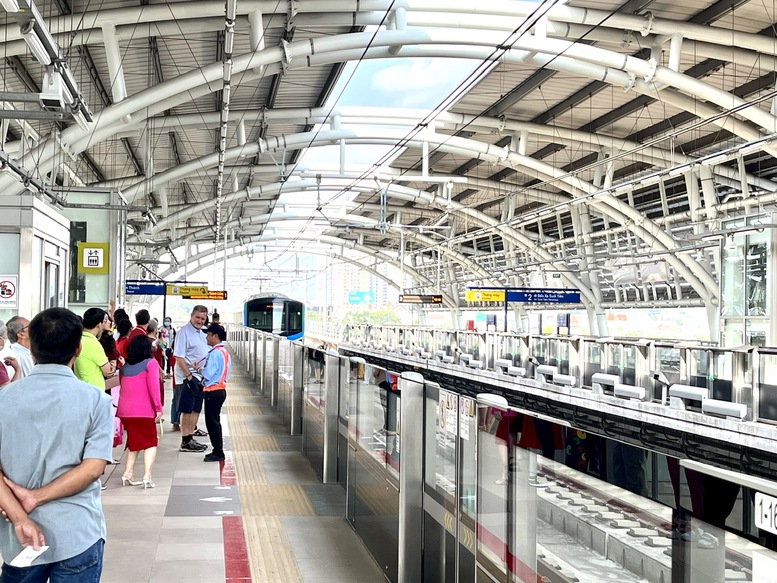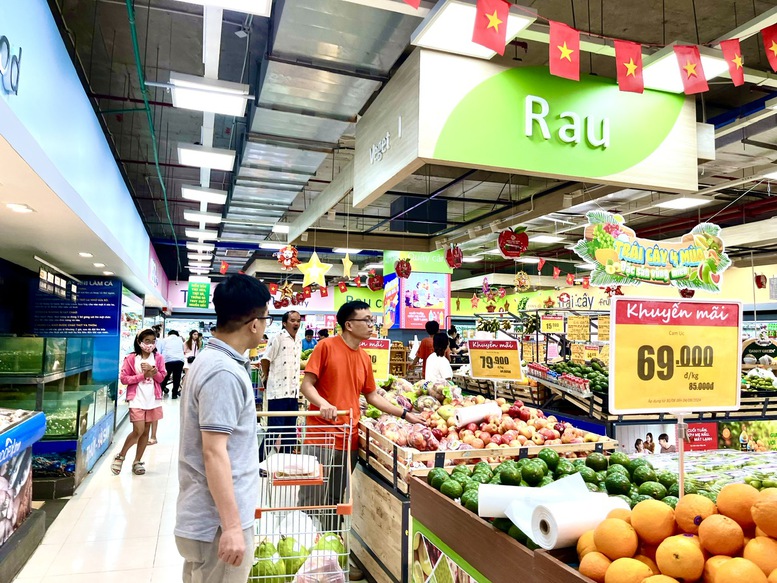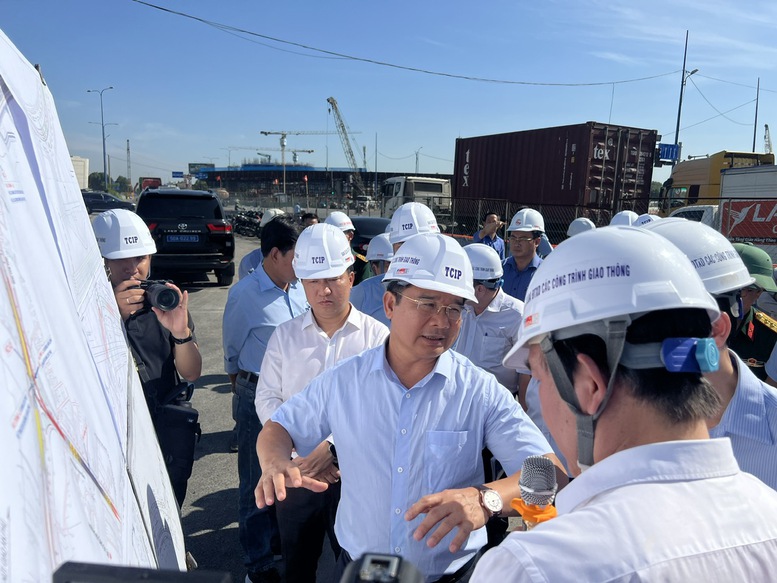(Chinhphu.vn) – An enabling and service-oriented government, together with a pioneering, resilient, and innovative business community, will be the key for Ho Chi Minh City to achieve double-digit growth and confidently move forward with the nation into a new era of progress.

Businesses have proposed that Ho Chi Minh City accelerate public investment, with a priority on developing transportation infrastructure. – Photo: VGP/Le Anh
Ho Chi Minh City – the nation’s most dynamic economic hub, now stands at a pivotal moment, where challenges and opportunities intertwine. This critical juncture demands bold reforms from both the government and the business community. In its aspiration to rise alongside the nation, the city must make a breakthrough to regain its momentum for double-digit growth.
To turn this ambition into reality, an enabling, service-oriented government and a courageous, pioneering, and innovative business community are indispensable. Together, they will steer Ho Chi Minh City’s economic vessel toward greater horizons.
Unlocking Investment Resources for Private Enterprises
According to experts, from a macroeconomic perspective, Ho Chi Minh City must focus on three key pillars to accelerate its development: infrastructure, technology, and human capital. Specifically, the city should fast-track investments in transportation and logistics infrastructure to enhance connectivity and reduce costs for businesses. At the same time, it must promote the widespread adoption of digital technologies and digital transformation in both management and business operations to improve efficiency. Lastly, creating an environment that attracts talent, supports startups, and fosters the development of a high-quality workforce is essential.
Addressing the core issues for Ho Chi Minh City’s rapid and sustainable development in the coming years, Mr. Trinh Tien Dung, Vice Chairman of the Ho Chi Minh City Business Association (HUBA), emphasized that the city should focus on three main pillars to drive growth and ensure long-term sustainability.
The first pillar is public investment, with a strong emphasis on transportation infrastructure. Priority should be given to the construction and completion of Metro rail lines to establish an integrated urban transit system. Additionally, the city must accelerate the development of Ring Roads 3 and 4 to enhance regional connectivity between Ho Chi Minh City and neighboring provinces and cities.
The second pillar, according to Mr. Dung, is attracting high-quality foreign direct investment (FDI). However, he emphasized that incentive policies for FDI enterprises must be carefully considered and accompanied by effective monitoring mechanisms. Incentives should not be granted across the board, especially, in sectors where domestic enterprises already hold competitive advantages in order to ensure fair and balanced development.

Mr. Trinh Tien Dung, Vice Chairman of HUBA, emphasized that Ho Chi Minh City should focus on three key pillars to drive growth and ensure sustainable development. – Photo: VGP/Le Anh
In reality, recent years have shown that domestic enterprises are fully capable of taking on and successfully completing national key projects when given the opportunity. A prime example is the rapid construction of Terminal T3 at Tan Son Nhat Airport, which was completed on schedule for the April 30th holiday. This achievement was partly due to the use of steel structures provided by local firms such as Dai Dung Group. This company has also been selected as a contractor for supplying and installing steel structures in major airport projects, including Terminal T2 of Noi Bai International Airport and Long Thanh International Airport.
At recent meetings and dialogues with city authorities, many businesses have proposed that Ho Chi Minh City take bold steps to commission private enterprises for infrastructure, industrial production, and green energy projects. Doing so would not only foster the growth of domestic businesses but also help create world-class products and services, enhancing the global competitiveness of Vietnamese enterprises.
The third pillar highlighted by HUBA Vice Chairman Trinh Tien Dung is the development of the private sector. As a key driver of economic growth, the private sector requires a tailored development strategy that addresses the needs of various business groups – from large corporations to SMEs and individual entrepreneurs. “In particular, the leading role of large enterprises must be leveraged, while the business environment should be truly favorable, transparent, and stable to ensure fair and inclusive growth” Mr. Dung emphasized.
Meanwhile, small businesses and individual entrepreneurs should be encouraged and supported to tap into their potential and grow. According to Ms. Ly Kim Chi, Chairwoman of the Ho Chi Minh City Food and Foodstuff Association, the city currently has around 400,000 individual businesses, of which more than 20,000 have been operating effectively and sustainably for decades. If these businesses are provided with guidance, support, and the opportunity to transition into formal enterprises, along with creating mechanisms for networking, Ho Chi Minh City could see a significant increase in the number of strong and capable enterprises.
To ensure the private sector continues to grow strong and contribute significantly to the city’s economy in the coming years, Mr. Le Huu Nghia, Chairman of the Binh Tan District Business Association, recommended that Ho Chi Minh City continue to accelerate administrative reforms and create favorable conditions for businesses. He also urged relevant authorities to effectively and fairly regulate the development of e-commerce, ensure the traceability of product origins, and impose strict penalties for counterfeit and substandard goods. This would ensure fair competition for Vietnamese businesses in the local market.

Boosting domestic consumption is one of the key drivers of Ho Chi Minh City’s economic growth. – Photo: VGP/Le Anh
To support Vietnamese businesses in strengthening their presence in the domestic market and expanding exports, Mr. Nghia suggested that Ho Chi Minh City continue to promote domestic consumption stimulation programs, while also developing the tourism market in line with government policies on expanding visa exemptions and extending visa durations. Additionally, the city should restructure its investment and trade promotion programs to focus on cost efficiency and strategic priorities, ensuring effective support for Vietnamese enterprises.
An Increasingly Attractive Investment Environment
Chairman of Ho Chi Minh City People’s Committee, Nguyen Van Duoc, stated that the Ho Chi Minh city is always focused on improving the investment and business environment by enhancing administrative reforms, improving the capacity of the workforce, and increasing transparency and openness in administrative procedures. Regarding administrative reform efforts, the city’s leader emphasized that this is a key and ongoing task. The city will reduce intermediary steps and streamline procedures even further to create an increasingly attractive investment environment.
In parallel, the city is intensifying efforts to build a digital government by applying information technology to shorten processing times for administrative documents and reduce costs for businesses.

Chairman of the Ho Chi Minh City People’s Committee, Nguyen Van Duoc, inspects the city’s key projects.
In addition, Ho Chi Minh City is implementing various policies to support businesses, including credit assistance, workforce training, and encouragement for innovation and sustainable development. These initiatives aim to promote a green economy and a digital economy, thereby enhancing the competitiveness of enterprises.
To achieve its target of double-digit growth, the city is also enhancing public investment stimulation and leading private investment. The immediate focus is on resolving challenges for 571 delayed projects to increase revenue and boost domestic consumption.
In meetings with businesses and various departments, Ho Chi Minh City’s Chairman, Nguyen Van Duoc, has repeatedly emphasized the importance of involving private enterprises in public investment projects to drive economic and infrastructure development. He believes that collaboration between the government and businesses is essential to achieving sustainable growth. Chairman Duoc also urged and called on businesses to participate in key city projects, especially in areas like transportation infrastructure, education, healthcare, and tourism, to lay a strong foundation for economic development.
Furthermore, Chairman Duoc highlighted that to support businesses in expanding and diversifying their export markets, the city will restructure its investment and trade promotion programs, focusing on large, stable, and promising export markets.
